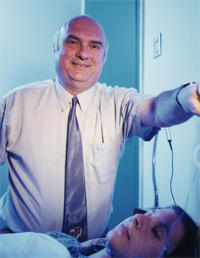Dr. Carlyle Smith Receives 2009 Distinguished Scientist Award from Canadian Sleep Society
Canada’s Premier Sleep Research Award Presented to Trent Psychology Professor
 Trent University is pleased to announce that psychology professor Dr. Carlyle Smith has won the prestigious 2009 Distinguished Scientist Award from the Canadian Sleep Society (CSS).
Trent University is pleased to announce that psychology professor Dr. Carlyle Smith has won the prestigious 2009 Distinguished Scientist Award from the Canadian Sleep Society (CSS). “The award was a complete surprise, but very meaningful. There are a number of really excellent sleep researchers in Canada, mostly at much larger institutions,” said Professor Smith who received the award in recognition of his significant contributions to the field of sleep research in Canada. “To be considered the best in the whole country means a great deal to me.”
As a Lifetime Professor Emeritus of Psychology at Trent University in Peterborough, Ontario, Canada, Prof. Smith is an internationally renowned for his expertise on the topic of sleep. His constant interest in how the brain processes information from its waking hours during sleep is facilitated by Trent University’s world-class sleep research laboratory.
“The research at Trent has focused on how memories of events during the day are further processed during sleep. Without this sleep processing, memories are not nearly as robust and complete,” explained Prof. Smith. “The idea that you are resting while you sleep is somewhat of an illusion. The brain and body are very busy doing everything from cell repair to memory consolidation.”
Prof. Smith is credited with a number significant findings, including the development of the rapid eye movement (REM) Sleep Window. Together with his graduate students, he has found that this “window of dreaming-type sleep” occurs at certain times on the sleep night after the individual learns a brand new task. Without this sleep, the learning is much less complete and there is memory loss. As well, he has shown that different kinds of sleep are important for different kinds of learning. For example, learning of a difficult new concept requires REM sleep, while motor learning (as in sports) requires stage two sleep and memorizing of material for an exam requires all the stages of sleep.
Dr. Smith has been published widely on the topic of sleep and memory and co-authored the book Sleep and Brain Plasticity with Dr. P. Maguet and Dr. R. Stickgold. His work has also been featured on numerous TV documentaries and in major newspapers across North America.
Established by the Canadian Sleep Society in 2007, the Distinguished Scientist Award is given annually to a member of the Canadian research community in recognition of significant contributions to in the field of sleep research.
For more information about the Psychology Department at Trent, please visit their web site.
